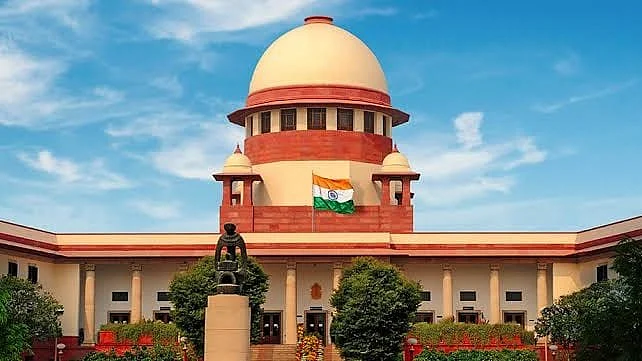Disqualification of BRS MLAs: SC brings anti-defection law back under lens
Bench headed by CJI B.R. Gavai questions Speaker’s inaction and calls for legal reform to protect democracy

In a move intended to checkmate the misuse of discretionary powers by state Assembly speakers pertaining to cases of disqualification, the Supreme Court on 6 August gave Telangana Assembly speaker Gaddam Prasad Rao three months to decide the fate of 10 MLAs of the Bharat Rashtra Samithi (BRS) accused of defecting to the Congress. The court's intervention reflects the growing concern over stalling tactics that undermine the anti-defection law and threaten democratic accountability.
The MLAs in question had joined the Congress but have since retracted their decision, claiming they continue to remain with the BRS. Their U-turn is seen as an afterthought, most likely motivated by the threat of disqualification under the Tenth Schedule of the Constitution.
The 52nd amendment to the Constitution passed in 1985 — known as the anti-defection law — allows defection only if two-thirds of the members of a party break away together. However, the practice has been clouded by the discretionary power given to Assembly speakers, who tend to sit on the procedure.
The Supreme Court bench led by Chief Justice of India B.R. Gavai said this practice amounted to a situation where “the operation succeeds but the patient dies”, and urged Parliament to revisit the effectiveness of the current legislation. The court emphasised that while the speaker's powers are legal under the Constitution, they are not beyond judicial review.
The court, however, rejected the BRS plea to disqualify the defecting MLAs, saying it is the speaker’s responsibility. It found fault with the speaker for failing to act on the disqualification petitions which were filed as early as January this year. The judges recalled that the court had asked senior advocate Mukul Rohatgi to elicit the time needed by the speaker to decide on the issue.
The case arose after separate special leave petitions (SLP) were filed on 15 January by BRS MLAs Padi Kaushik Reddy and K.P. Vivekanand seeking action against MLAs Danam Nagender, Tellam Venkat Rao, Kadiyam Srihari and others. The current judgment was given after combining all the SLPs into one hearing.
The case of Danam Nagender is particularly intriguing. Though he is an MLA from the BRS, he contested, and lost, the 2024 Lok Sabha elections from Secunderabad on a Congress ticket. He is often seen in the company of the CM and other Congress leaders.
Telangana Pradesh Congress Committee president Mahesh Kumar Goud has confirmed that the speaker is seeking legal opinion on the SC judgement. “The court cannot say anything more. The case of Danam Nagender is dicey. We are ready to face by-polls and local body polls,” he said.
Congress MLC Addanki Dayakar said the speaker’s word would be final. He also pointed out that the BRS had previously merged entire legislature parties into its fold, including those from Congress, TDP and BSP even when it had a clear majority. “Many defectors were rewarded with ministerial berths, including Talasani Srinivas Yadav in 2014 and Sabita Indra Reddy in 2019,” he added.
BRS MLC Dasoju Sravan defended past mergers under legal provisions and accused Congress of hypocrisy. “They championed automatic disqualification in their 2024 manifesto, but when in power, hesitate to act. Why wait for SC intervention?” he asked.
Asked how to deal with this situation, senior Supreme Court advocate P. Niroop said it was “an exercise in futility” and there is no solution. “Even when rules are in place, courts can't compel speakers to act swiftly. The system is designed to delay,” he said.
He stressed that legislatures must follow democratic conventions and gave the example of former Uttar Pradesh chief minister Mayawati, who acted against her MLAs for associating with rivals outside the Assembly, as allowed by party-framed rules.
At the national level, this judgment reignites a long-standing debate: should disqualification powers remain with partisan speakers, or be transferred to independent authorities like the Election Commission? The Supreme Court’s pointed criticism revives calls for urgent reforms.
The anti-defection law was aimed at putting an end to the ‘aaya Ram gaya Ram’ style of politics seen through the 1960s and '70s. While the new law initially checked open floor-crossing, it has since been weakened by political complicity and procedural loopholes. Articles 102(2) and 191(2) of the Constitution provide the basis for disqualifying MPs and MLAs, respectively, and the Tenth Schedule lays down the law. But enforcement remains the missing link.
Niroop also expressed dismay at the long delays in courts and said election matters are dealt with like a civil case and not disposed of in a time-bound manner. Even violation of rules during an election is held back, making it infructuous by the time a verdict is given. He recalls the case of BRS MLA Chennamaneni Ramesh, elected four times to the Assembly, but found to be a German citizen after his fourth tenure.
The Telangana case is a microcosm of a larger malaise affecting Indian democracy. Across states, ruling parties have been accused of poaching legislators to topple governments or secure majorities — often with impunity. While the SC order gives the Telangana speaker a deadline, it also sends a clear signal that delay is no longer an option.
Follow us on: Facebook, Twitter, Google News, Instagram
Join our official telegram channel (@nationalherald) and stay updated with the latest headlines
